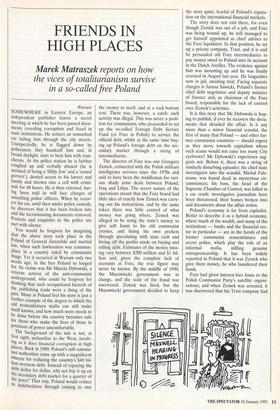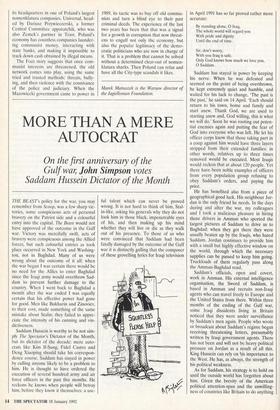FRIENDS IN HIGH PLACES
Marek Matraszek reports on how the vices of totalitarianism survive in a so-called free Poland
Warsaw SOMEWHERE in Eastern Europe, an independent publisher leaves a secret meeting at which he has been passed docu- ments revealing corruption and fraud in state institutions. He notices an unmarked car tailing him through the city streets. Unexpectedly, he is flagged down by policemen; they handcuff him and, in broad daylight, start to beat him with trun- cheons. At the police station he is further roughed up and verbally abused (he is accused of being a 'filthy Jew' and a 'sexual pervert'), denied access to his lawyer and family and thrown into a cell with crimi- nals for 48 hours. He is then released, hav- ing been told he will face charges of assaulting police officers. When he recov- ers his car, until then under police custody, he discovers that it has been broken into and the incriminating documents removed. Protests and enquiries to the police are met with silence.
You would be forgiven for imagining that the above story took place in the Poland of General Jaruzelski and martial law, when such lawlessness was common- place in a country ruled by communist thugs. Yet it occurred in Warsaw only two weeks ago, in the free Poland so longed for. Its victim was Mr Marcin Dybowski, a veteran activist of the anti-communist underground, who could be forgiven for thinking that such occupational hazards of the publishing trade were a thing of the past. Many in Poland feel his story is just a further example of the degree to which the old nomenklatura mafia can still make itself known, and how much more needs to be done before the country becomes safe for those who make the lives of those in positions of power uncomfortable. The background of the, tale is not, at first sight, unfamiliar to the West, involv- ing as it does financial corruption in high places. Back in 1989, Poland's still commu- nist authorities came up with a magnificent wheeze for reducing the country's $40 bil- lion overseas debt. Instead of repaying the debt dollar for dollar, why not buy it up on the secondary debt market for a quarter of the price? That way, Poland would reduce its indebtedness through coming to owe the money to itself, and at a rock-bottom cost. There was, however, a catch: such activity was illegal. This was never a prob- lem for communists, who proceeded to set up the so-called Foreign Debt Service Fund (or Fozz in Polish) to service the official debt, whilst at the same time buy- ing up Poland's foreign debt on the sec- ondary market through a string of intermediaries.
The director of Fozz was one Grzegorz Zemek, connected with the Polish military intelligence services since the 1970s and said to have been the middleman for vari- ous shady arms deals between Poland, Iraq and Libya. The secret nature of the operations meant that the Fozz board had little idea of exactly how Zemek was carry- ing out his instructions, and by the same token there was little control of what money was going where. Zemek was alleged to be using the state's money to give soft loans to his old communist cronies, and lining his own pockets through speculating with state cash and hiving off the profits made on buying and selling debt. Estimates of the money miss- ing vary between $200 million and $1 bil- lion and, given the complete lack of accounts at Fozz, the true figure may never be known. By the middle of 1990, the Mazowiecki government was in charge, and the scale of the fraud was uncovered. Zemek was fired, but the Mazowiecki government decided to keep the story quiet, fearful of Poland's reputa- tion on the international financial markets.
The story does not end there, for even though Zemek was out of a job, and Fozz was being wound up, he still managed to get himself appointed as chief adviser to the Fozz liquidator. In that position, he set up a private company, Trast, and it is said he persuaded old Fozz intermediaries to pay money owed to Poland into its account in the Dutch Antilles. The evidence against him was mounting up and he was finally arrested in August last year. He languishes now in jail, awaiting trial. Facing separate charges is Janusz Sawicki, Poland's former chief debt negotiator and deputy minister of finance and, as chairman of the Fozz board, responsible for the lack of control over Zemek's activities.
It is this story that Mr Dybowski is hop- ing to publish, if ever he recovers the docu- ments that detailed the affair. Is it any more than a minor financial scandal, the first of many that Poland — and other for- mer communist countries — should expect as they move towards capitalism where such scams would not raise too many City eyebrows? Mr Dybowski's experience sug- gests not. Before it, there was a string of similarly disturbing episodes: the chief state investigator into the scandal, Michal Falz- mann, was found dead in mysterious cir- cumstances; his boss, the head of the Supreme Chamber of Control, was killed in a car crash; investigative journalists have been threatened, their homes broken into and documents about the affair stolen.
Poland's economy is far from capitalist. Better to describe it as a hybrid economy, where much of the wealth, and many of the institutions — banks and the financial sec-
tor in particular — are in the hands of the former communist nomenklatura and secret police, which play the role of an informal mafia, stifling genuine entrepreneurship. It has been widely reported in Poland that it was Zemek who gave them money, he who laundered their funds.
Fozz had given interest-free loans to the Polish Communist Party's satellite organi- sations; and when Zemek was arrested, it was discovered that his Trast company had its headquarters in one of Poland's largest nomenklatura companies, Universal, head- ed by Dariusz Przywieczerski, a former Central Committee apparatchik, who was also Zemek's partner in Trast. Poland's economy has countless companies launder- ing communist money, interacting with state banks, and making it impossible to track down cash obtained by illegal means.
The Fozz story suggests that once com- munist interests are threatened, the old network comes into play, using the same tried and trusted methods: threats, bully- ing, and then violence with the connivance of the police and judiciary. When the Mazowiecki government came to power in 1989, its tactic was to buy off old commu- nists and turn a blind eye to their past criminal deeds. The experience of the last two years has been that that was a signal for a growth in corruption that now threat- ens to engulf not only the economy, but also the popular legitimacy of the demo- cratic politicians who are now in charge of it. That is a problem that cannot be solved without a determined clear-out of nomen- klatura sharks. Then Poland can relax and have all the City-type scandals it likes.
Marek Matraszek is the Warsaw director of the Jagiellonian Foundation.



















































 Previous page
Previous page